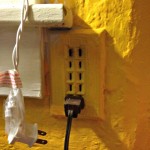There are plenty of bad design choices out there. All you have to do is gawk at a site like Bad MLS Photos or even just walk around Quincy --…

What’s a home equity loan, and what’s a line of credit?
That equity is part of your net worth, but it’s mostly “on-paper” wealth — if home values suddenly tank, as they did in 2008, well… your equity might evaporate. Still, if you want to access some of that stored wealth and turn it into something tangible, like a new kitchen, you can.
There are two ways to tap your home’s equity (besides selling the home at a profit): a home equity loan, and a home equity line of credit (or HELOC, they call it). Here are the key differences:
Home equity loan
A home equity loan is a regular one-time secured loan, like a mini-mortgage or a car loan. You get a fixed rate and term for paying it back (e.g., 10 years at 3.5%), they give you a lump-sum check for thousands of dollars, and then you start paying it back each month.
This is good for big projects where you’re going to spend all the money at once — on a major renovation, for example, or even on a full year of college tuition.
Note that those are investments in your future. I suppose you could also just go buy a sailboat, quit your job, and travel the world until the money runs out, but that’s not a great financial move!
Home equity line of credit (HELOC)
A line of credit is almost like a credit card (with a very low interest rate). You have a 10-year “draft” window, when you can take out money against your credit line for any purpose.
You just write checks as you need the money, and for that first 10 years you only pay the interest on that debt. (You can pay more if you want to, obviously, but your minimum payments are just the interest.)
Then, after 10 years, the party’s over and you start the repayment process. This is good if you want to use the money for lots of different purposes over time; it’s obviously more flexible.
BUT, in 10 years, when it’s time to start paying the proverbial piper, I can almost guarantee interest rates will not be as low as they are now, because they literally cannot get lower.
We actually have a hybrid of these two, which Eastern Bank offers, and I like that. We have a $30K line of credit, and we took out a one-time $20K loan from that credit line for our downstairs renovations, with a 10-year fixed rate to pay it back (at like, 3.5% or something crazy low).
So we still have $10K available in that line of credit that we could just randomly tap, if and as we needed to (a nice emergency buffer), and we could take our time paying it back.
How much to take out?
You need to have at least 20% equity in your house obviously in order to take out anything. So if your house is worth $500,000, and your mortgage is $300,000, you’ve got 40% equity and you could take out, conceivably, up to $100,000.
Definitely don’t take out everything you possibly can though, that’s the road to ruin!
Most of the big banks have pretty high minimums, like $30,000. Eastern wasn’t too bad with that, it might have been a $10K minimum. I didn’t want to be on the hook for too much. And of course, your credit score and income-to-debt ratios and all that play a factor.
Should you do it?
In the short term, it decreases your monthly cash flow. Because of our two low-interest loans (we have a MassSAVE loan at 0%, which we used to replace our boilers and convert to gas, and the home equity loan at 3.5%) we’re on the hook for like $330/month more every month.
But, we used that money to make much-needed improvements in our home that absolutely added a ton of value to it — probably as much or more than we put into it even. Like I feel like we took out $27,000 and added $25,000+ to the value of the house.
Assuming you use the money for judicious home improvements (e.g., an updated bath or new roof, not a marble hot tub), and you end up selling your house before you’ve paid back the loan, you’ll likely recoup that extra cash in the purchase price and be able to pay it back no sweat (and then some).
But yeah, it adds another monthly bill to your budget. If you have a big project in mind, it’s certainly a better deal than paying for most of it with credit cards or exhausting your emergency fund. But if you can save up to pay for that project instead of taking out the loan, of course then you won’t have another monthly payment to worry about for the next 10 years.
Then again, at such a low interest rate, it’s not a bad deal at all, and it can buy you the time you need to pay it off in full. We could and probably will pay ours off before the 10 years are up, but we would have been beyond broke if we had dumped $20,000 in savings into our house last year — even though it desperately needed it.
Verdict: Anyway, if you have sufficient equity built up in your home, and you use the funds to add real value to your house, I think it’s one of the better financial moves you can make when rates are as low as they are right now.



